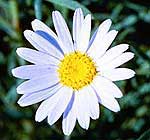 |
|
St. John's Wort |
 |
|
St. John's Wort |
By Howard Rosenthal, Ed.D., L.P.C.
Could your depression be a product of dietary imbalances or blood sugar swings? If you're feeling blue, vitamins, minerals and amino acids may help lift your spirits.
Natural remedies are often excellent alternatives or complements to prescription drugs routinely prescribed for depression. This is comforting since as many as 8 to 10 million Americans suffer from symptoms of depression. Depression is becoming more commonly identified, especially in younger people, and 75 percent of all patients admitted to hospital stress units and psychiatric facilities are depressed, making it the "common cold" of psychiatry.
Anyone who's severely depressed or suicidal is urged to see a competent physician or psychotherapist immediately. Yet, since depression is a function of our thoughts, emotions and body chemistry, the so-called chemical imbalance inherent in this condition may be corrected via changes in diet or nutritional supplements. Consult your health care practitioner before beginning any supplement program to treat depression.
Low blood sugar or hypoglycemia, which ironically is caused by eating too much sugar rather than too little or by going too long without eating, can be responsible for some people's mood fluctuations. Individuals with low blood sugar levels often display abnormal brain wave patterns. A plunge in blood sugar levels, which is often the result of a chromium deficiency, affects the entire nervous system, especially the brain. Blood sugar, or glucose, is the brain's primary food. Depressed people are thus advised to consistently curb their sugar intake.
Chromium picolinate, a trace mineral, often helps stabilize this condition and sometimes helps abate sugar cravings. Gary Evans, Ph.D., of Bemidji State University in Minnesota, conducted studies in which chromium picolinate was shown to help reduce fat while building lean muscle mass when it was combined with moderate exercise. You should note that moderate exercise (not 26-mile marathons)–like a prescription antidepressant–produces neurochemicals called catecholamines that help ward off the blues.
People whose blood sugar fluctuations don't respond to chromium picolinate alone sometimes get results by adding the mineral vanadium or vandyl sulfate supplements to their diets. Vanadium may play a role in blood sugar regulation, according to Elson Haas, M.D., in Staying Healthy with Nutrition (Celestial Arts). While there's no Recommended Daily Allowance for vanadium, Haas indicates that most people get enough through dietary sources such as soy, sunflower, safflower, corn and olive oils.
Garlic, an herb known for its ability to fight infection, has also been shown to lower blood sugar levels and could help in balancing hypoglycemia in a depressed person.
Balancing Your Moods
Some trace mineral formulas contain the mineral lithium, a known mood stabilizer found in food and water. For years, even traditional psychiatrists have prescribed lithium for individuals who suffer from depression or manic-depression, known as a bipolar disorder (Journal of Psychopharmacology, 1992, vol. 6). Persons suffering from this condition are afflicted with cyclical mood swings characterized by euphoria followed by severe depression.
How lithium works is still a mystery, yet some data indicate that areas of the country with low lithium content in the water supply have higher homicide, suicide and crime rates (Biological Trace -Element Research, 1990, vol. 25).
The amino acid L-tyrosine taken on an empty stomach is a powerful antidepressant, and I've had a number of clients who felt this supplement was more effective than prescription medicines without the side effects. L-tyrosine is a precursor for the brain's neurotransmitter serotonin, which helps dispel depression and create a calm mood.
If depression is accompanied by insomnia pumpkin seeds often provide a wonderful source of relief. Pumpkin seeds supply a safe and natural source of L-tryptophan (the least abundant amino acid in most people's diets). L-tryptophan aids sleep and works with L-tyrosine to raise levels of serotonin in the brain–levels that are typically low in cases of depression. Anecdotal reports indicate that pumpkin seeds and turkey, which is also a good source of L-tryptophan, can improve your outlook on life.
Another sleep aid that helps stabilize brain chemistry is the hormone melatonin. Disturbed sleep patterns are common in many cases of depression, and melatonin provides relief by acting as a powerful, nonaddictive sleeping agent. Some prescription antidepressants raise melatonin levels, point out Walter Perpaoli, M.D., Ph.D., and William Regelson, M.D., in their book The Melatonin Miracle (Simon ~ Schuster). Hence melatonin's role in ameliorating despair may go beyond its propensity to stimulate peaceful, restful sleep. Clearly, additional research is warranted.
Generally, melatonin works best if consumed about a half-hour before bedtime. If you experience grogginess upon awakening, reduce your dosage. It should be mentioned that some individuals who've tried melatonin supplementation report increased depression. In such cases, seek professional assistance and stop supplementation. It should also be noted that there's been almost no research done on long-term melatonin supplementation, so it's advisable to take this hormone for short periods of time.
The herb St. John's wort (Hypericum perforatum) is routinely prescribed in other countries for depressive disorders. Like some of the other aforementioned natural remedies, research indicates that St. John's wort raises the level of antidepressant chemical messengers in the brain (Arzneim Forsch, 1984, vol. 34). The herb is seemingly more effective when ingested for brief periods of time (six weeks or less). Individuals who decide to take St. John's wort should avoid excessive sunlight and tanning booths because this botanical medicine increases the body's sensitivity to light.
When depression is accompanied by panic or anxiety, the addition of a magnesium supplement is generally helpful. Low magnesium levels impair nerve impulses and are often observed in individuals who suffer from nervous conditions, so supplementation could help this problem.

Chamomile
Another antianxiety remedy is the common herb chamomile, especially when taken as herbal tea. Chamomile produces a mild, calming, sedative effect. Moreover, chamomile tea can replace caffeinated beverages such as coffee, which often induce shaking, jitters and agitation–characteristic symptoms of anxiety disorders. If anxiety or anxiety attacks is one of your problems, slowly eliminate caffeine from your diet.
Creating a Happier Environment
The use of a negative ion generator in your home and work environment often helps combat a depressive condition. Positive ions (atoms that carry a positive electrical charge as a result of having gained one or more electrons) are associated with sadness and even suicidal feelings, say Fred Soyka and Alan Edmonds in their book The lon Effect (Bantam). Positive ions are generated by synthetic clothing and artificial environments with heating and cooling systems. Negative ions, which counteract the effects of positive ions, tend to act as powerful mood elevators in some people. Pets and even plants seem to thrive better in an atmosphere with a high concentration of negative ions. Many popular brands of air purifiers now also sport built-in negative ion generators.
If you or a family member suffer from depression, get help immediately. Professional psychotherapy and a general physical exam as well as a balanced diet, exercise and dietary supplements can often make the world a rosier place to live. If you don't know how to find a competent psychotherapist, contact your local mental health association or telephone crisis help line.
Howard Rosenthal, a certified clinical mental health counselor, is the human services program director at St. Louis Community College and a private practice therapist. He's the author of several books including Help Yourself to Positive Mental Health (Taylor & Francis). You can write him at 11656 Holly springs Dr., St. Louis, MO 63146.

Oregon Grape
Reprinted with permission from the July 1996 issue of Delicious! Magazine, a publication of New Hope Communications, Boulder, CO.